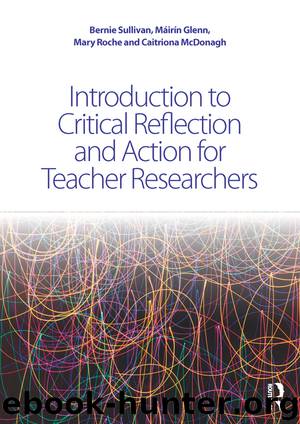Introduction to Critical Reflection and Action for Teacher Researchers by Bernie Sullivan Máirín Glenn Mary Roche & Caitriona McDonagh

Author:Bernie Sullivan, Máirín Glenn, Mary Roche & Caitriona McDonagh
Language: eng
Format: epub
ISBN: 9781317435112
Publisher: Routledge
I can explain what happened in the research example above as follows. Initially, I had used quantitative data-gathering tools – for example, test scores. When I reflected on my supervisor’s question I realised that I also needed to use qualitative tools. We believe that data-gathering in self-study action research doesn’t fit neatly into either side of the debates about quantitative and qualitative data. This debate has both philosophical and epistemological underpinnings, which can help you explain your choices of data collection. The philosophical basis of my initial information-gathering was that, by using accurate, analytical methods and by controlling other factors, I could come to a simple, distilled truth. Epistemologically, this places knowledge as information – a box-able set of facts that can be handed from one person to another. It follows the Aristotelian idea that there is only way of knowing, By contrast, when I considered the questions of my supervisor, changes in my data-gathering approaches reflected ‘the Platonic search for explanations of his world’ (McDonagh 2007: 201) and his view that there is no one ‘right’ way of knowing (ibid.: 242).
No matter how carefully we try to organise our data-gathering and test our claims to new learning, our reality intrudes and often causes problems. The experience of conducting the action, reflection and evaluation on one’s teaching is a living process that can take on a life of its own – increasing the forms and often the amount of information collected. If you are researching your practice for accreditation purposes, you will have to decide for yourself when to stop formally gathering data. Because teaching and learning are continuous processes, often a college deadline or approaching date for meeting with colleagues is what draws a particular research cycle to a close. We authors have found that living theory action research is an ongoing process – in fact, a life-long process of research and professional development. Your project and formal studies may stop, but your action researcherly disposition (Roche 2014) continues because action research can be a transforming and life-changing process. Based on our experiences, our key suggestion, when collecting data in the messiness of the living reality of classrooms, is to trust the untidy reality of action research (Mellor 1998, 2015; Cook 2009).
Ways of collecting qualitative data in research often grow as the actions develop to suit the specific circumstances, location and participants. Recall how Glenn’s (2006) student added a new focus to her research earlier in this chapter. Messy methods of data collection are common experiences for teacher researchers (Mellor 2001; Glenn 2006). When the fog gets too thick and you feel overwhelmed, our advice is to look to your values and see how you might live them more fully in your practice. Mess can add to rigour. (Cook 2009: 277) refers to the rigour of gaining accreditation and the mess of actually gathering data as ‘strange bedfellows’. Cook argues that the purpose of mess is to help us move our thinking towards new constructions of knowing and that these, in turn, lead to transformations in practice.
Download
This site does not store any files on its server. We only index and link to content provided by other sites. Please contact the content providers to delete copyright contents if any and email us, we'll remove relevant links or contents immediately.
| Administration | Assessment |
| Educational Psychology | Experimental Methods |
| History | Language Experience Approach |
| Philosophy & Social Aspects | Reform & Policy |
| Research |
The Art of Coaching Workbook by Elena Aguilar(51198)
Trainspotting by Irvine Welsh(21663)
Twilight of the Idols With the Antichrist and Ecce Homo by Friedrich Nietzsche(18632)
Fangirl by Rainbow Rowell(9249)
Periodization Training for Sports by Tudor Bompa(8271)
Change Your Questions, Change Your Life by Marilee Adams(7780)
This Is How You Lose Her by Junot Diaz(6885)
Asking the Right Questions: A Guide to Critical Thinking by M. Neil Browne & Stuart M. Keeley(5774)
Grit by Angela Duckworth(5614)
Red Sparrow by Jason Matthews(5471)
Paper Towns by Green John(5188)
Room 212 by Kate Stewart(5119)
Ken Follett - World without end by Ken Follett(4731)
Housekeeping by Marilynne Robinson(4446)
The Sports Rules Book by Human Kinetics(4385)
Papillon (English) by Henri Charrière(4274)
Double Down (Diary of a Wimpy Kid Book 11) by Jeff Kinney(4268)
The Motorcycle Diaries by Ernesto Che Guevara(4098)
Exercise Technique Manual for Resistance Training by National Strength & Conditioning Association(4071)
